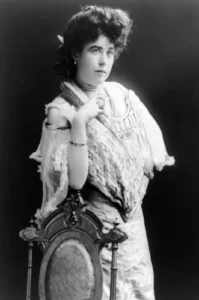Molly Brown: In the annals of history, certain individuals stand out not only for their actions but also for their indomitable spirit and resilience in the face of adversity. Among these luminaries is Margaret “Molly” Brown, a name forever etched in the collective memory due to her heroic deeds and unyielding determination. More than a century after the sinking of the Titanic, Molly Brown’s legacy remains vibrant and influential. Here are seven compelling reasons why Molly Brown is still very famous.

- Survivor of the Titanic:
Molly Brown’s fame is intrinsically tied to the tragic sinking of the Titanic on April 15, 1912. As one of the survivors, Molly’s courage and fortitude during that fateful night set her apart. Her actions in assisting fellow passengers, rallying the lifeboat occupants, and urging the crew to return for more survivors showcased her selflessness. Molly’s survival and subsequent efforts to improve maritime safety have made her an enduring symbol of hope amid tragedy.
- The “Unsinkable” Moniker:
One reason Molly Brown remains famous is her association with the moniker “The Unsinkable Molly Brown.” This nickname, bestowed upon her after the Titanic disaster, encapsulates her tenacity and refusal to succumb to despair. The label not only became a part of her legacy but also a testament to human resilience, inspiring countless individuals to persevere in the face of life’s challenges.
- Humanitarian Efforts:
Beyond the Titanic, Molly Brown’s fame is further solidified by her extensive humanitarian efforts. A suffragette and philanthropist, she dedicated her life to various causes, including women’s rights, education, and workers’ rights. Her commitment to social justice and her tireless advocacy for the less fortunate contribute to her enduring fame as a champion of human rights and equality.

- Broadway and Hollywood Adaptations:
Molly Brown’s story has transcended the pages of history, finding new life on both Broadway and the silver screen. The musical “The Unsinkable Molly Brown,” which premiered in 1960, and the subsequent film adaptation in 1964 starring Debbie Reynolds, brought her character to a wider audience. These adaptations not only kept her legacy alive but also introduced Molly Brown to generations who might not have been familiar with her remarkable story.
- Historical Recognition:
Molly Brown’s fame is not confined to popular culture; she is also recognized in historical circles. The Molly Brown House Museum in Denver, Colorado, preserves her former residence and serves as a testament to her life and legacy. The house, now a designated historic landmark, attracts visitors from around the world, ensuring that Molly’s story continues to be shared and remembered.
- Feminist Icon:
In an era when women’s voices were often marginalized, Molly Brown stood as a beacon of feminism. Her unwavering commitment to women’s rights and her active involvement in the suffragette movement positioned her as a feminist icon. Molly’s legacy inspires women to embrace their strength, voice, and agency, making her a timeless figure in the ongoing struggle for gender equality.

- Literary and Academic Interest:
Molly Brown’s life has become a subject of interest for scholars and writers, ensuring that her story is explored and analyzed in various academic and literary contexts. Books, articles, and documentaries continue to shed light on different aspects of her life, contributing to the ongoing fascination with Molly Brown and her enduring impact on history.
Conclusion:
Molly Brown’s fame is not merely a product of historical circumstance; it is a testament to her extraordinary character, resilience, and dedication to making a positive impact on the world. From surviving the Titanic disaster to championing social justice causes, Molly Brown’s legacy continues to resonate, proving that her indomitable spirit transcends time and remains an inspiration for generations to come.
WRITTEN BY ALEX

